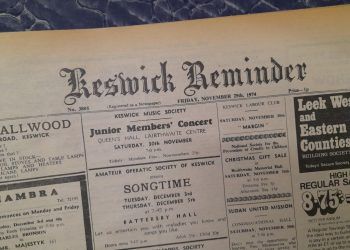
Cumbria County Council says the planned reorganisation of local government is unlawful and has launched a legal challenge against the Government.
The Government announced last month it chose a structure which will see the county split into East – the area covered by Eden, Barrow and South Lakeland councils – and West – the area covered by Allerdale, Copeland and Carlisle councils.
Ministers and civil servants had considered four bids submitted by Cumbrian leaders.
Cumbria County Council wanted to see a single authority covering the whole of the county called One Cumbria.
It has written to Robert Jenrick, the minister for housing, communities and local government in the first step of launching a judicial review against the Government’s decision.
It said the decision was unlawful and pointed out that on the same day as the announcement for Cumbria, it had adopted a single authority approach for Somerset and North Yorkshire.
Reasons Cumbria County Council believes the decision is unlawful
In the letter to Mr Jenrick, it says the decision is unlawful because:
- It left out of account necessarily material considerations which his own guidance requires to be taken into account;
- It failed to conscientiously consider the consultation responses of CCC showing why the Two Unitary Approach did not meet the SoS’s own guidance and would not
- deliver that which his guidance required;
- It failed to understand or apply his own guidance in terms of the required scale of the new unitary authorities and provided no reason to depart from that guidance;
- It failed to recognise that the Two Unitary Approach is predicated around the creation of a mayoral combined authority to ensure co-ordination on key matters thus adding a new tier of local government administration, undermining the savings claimed and the need for which was a key reason why a Single Unitary Approach was appropriate here;
- For no valid reason, acted inconsistently with his approach in North Yorkshire where a Single Unitary Approach was adopted – in the case of North Yorkshire factors in favour of a Single Unitary Approach were relied on but the same factors equally applicable to Cumbria were ignored in the Cumbria Decision;
- It appears could have been motivated by the possible party political advantage that splitting Cumbria in two may secure for his party. If this was a factor in the decision, it would be an abuse of power and unlawful;
- Acted irrationally; and
- Failed to provide adequate reasons addressing the principal controversial issues
The Government has been invited to withdraw the decision and reconsider its proposals by Cumbria County Council.
The letter asks for a response by August 23.
Cumbria’s Liberal Democrats have released the letter as they said they did not back council leader Stewart Young in the bid.
Peter Thornton, leader of the Liberal Democrat group on Cumbria County Council, said: “We have just 18 months to create two new Cumbrian councils from the seven existing councils.
“The county council Liberal Democrat Group believe that we should be concentrating on this task rather than expending time and money challenging the Government’s decision.”
Cumbria’s Liberal Democrat MP Tim Farron, who represents Westmorland and Lonsdale, said: “Launching a legal challenge against the reorganisation plans will be a waste of public money and time and I would strongly urge Stewart Young to reconsider.
“Liberal Democrats in Cumbria passionately believe that we should instead be focusing on serving local residents and concentrating on working on the issues that matter to them like jobs, schools, social care and the environment.”
A Cumbria County spokesman said: “After careful consideration Cumbria County Council has taken the decision to issue a pre-action protocol letter to the Secretary of State following its decision to create two new unitary councils for Cumbria.
“The pre-action protocol letter is the first step towards ‘potentially’ pursuing a Judicial Review.
“Government will now consider the information in our letter and respond. We will then review their formal response before deciding on our next steps.”








